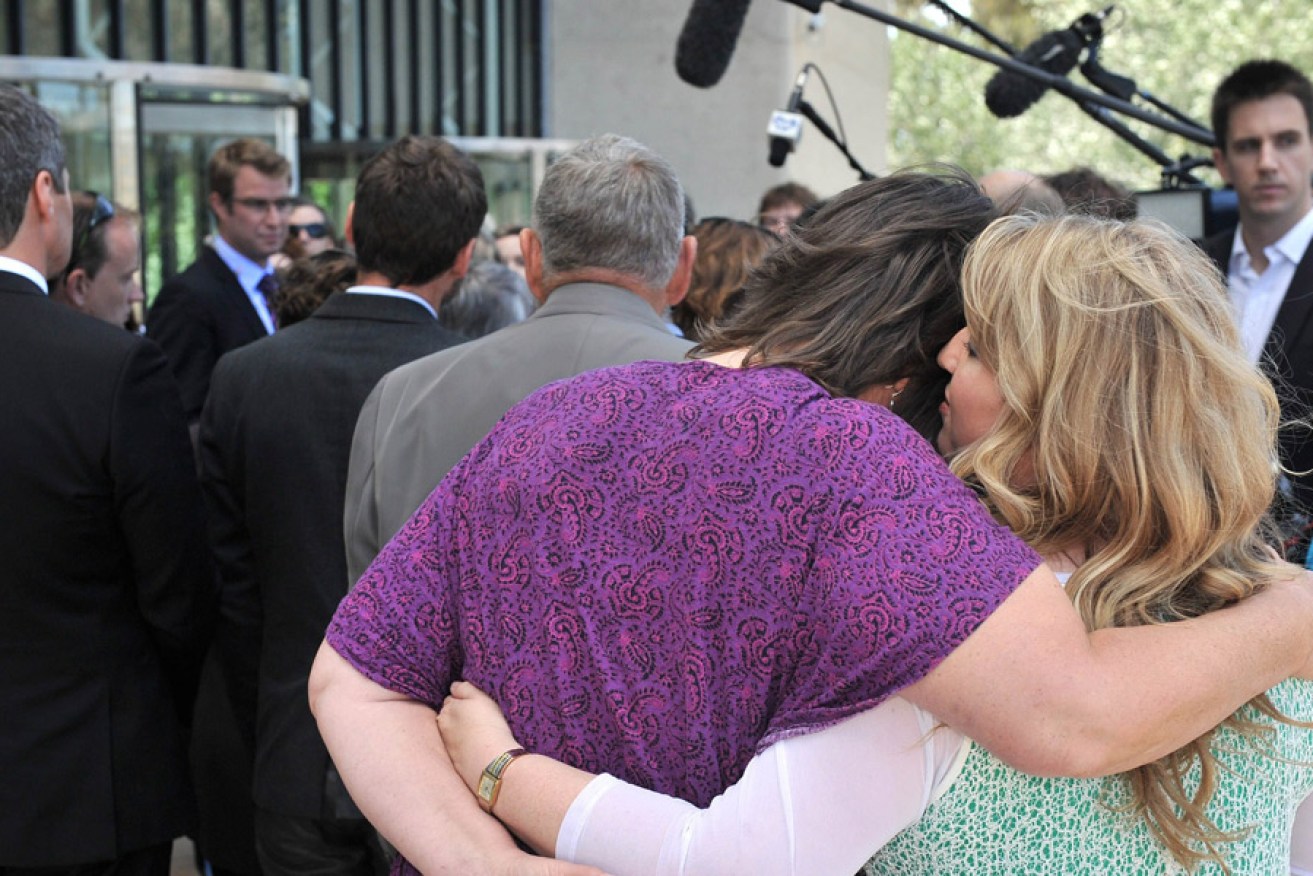Sitting in judgement on love

A couple hug outside the High Court in Canberra yesterday.
So the High Court has struck down the ACT law that paved the way for same-sex marriage.
Excuse me for not stomping my sensible shoes or dissolving in tears. It’s not that I don’t care – I desperately want to say “I do” to the woman I love – it’s just that the High Court ruling seemed sadly inevitable. And after several years listening to the lame excuses and shilly-shallying of Australia’s political leaders, it’s difficult to resist wallowing in a quagmire of dashed hopes and disillusionment.
Yesterday’s High Court judgement said that the ACT Marriage Equality (Same Sex) Act 2013 was inconsistent with current federal laws, which state that a marriage “can be solemnised only between a man and a woman and that a union solemnised in a foreign country between a same-sex couple must not be recognised as a marriage in Australia”.
Essentially, it’s saying that only the Australian Federal Government – not the states and territories, nor overseas countries – can decide what constitutes a legal marriage.
For the same-sex couples who took advantage of the small window of opportunity to wed in the ACT last weekend, this means their marriages are not legally valid. After the high of their public celebration of love and commitment, imagine the gut-wrenching disappointment they must feel now.
Any anger, however, should be directed not at the High Court judges, but at the federal political leaders who have failed to show commitment to the principles of equality and a fair go on which this country prides itself.
While other nations – including France, New Zealand and the UK – have moved in recent years to legalise marriage equality, Australia seems dogged by outdated conservative attitudes that should have been left behind with all that “honour and obey” business.
After a marriage proposal etched in the sand on a windswept Kangaroo Island beach several years ago, my partner and I dithered over where to seal our commitment: in Australia, where we live, or New Zealand, the country of my birth.
It became a waiting game, with both countries considering legislation that would legalise marriage equality. While the Australian Bills were doomed to failure, the Kiwi one passed by a vote of 77-44.
There were tears of joy that night, as we watched live coverage of New Zealand MPs from all political spectrums speaking out against prejudice and bigotry, and in favour of love, equality and family in all its glorious permutations. Here was a country that seemed 100 per cent more progressive; which recognised our relationship as equal to others. The decision of where we would marry was decided then and there.
I still hope that one day the Australian Federal Parliament will give me cause to feel that same pride and excitement.
Marriage-equality advocates believe there is cause for optimism.
Australian Marriage Equality national director Rodney Croome said that while yesterday’s High Court decision was disappointing, it also made it clear that the Constitution allowed the Federal parliament to legislate for marriage equality.
Defending her government’s decision to enact marriage equality, ACT Chief Minister Katy Gallagher argued that defeat in the High Court would compel the Federal Parliament to act. Australian Greens senator Sarah Hanson-Young yesterday introduced a marriage-equality Bill to parliament, while a Greens MP in Western Australia introduced a state same-sex marriage Bill which she believes could survive a High Court challenge.
Momentum is growing, and I am grateful for the equality advocates who refuse to go quietly into the night and have vowed to continue the fight.
But ultimately, change will require both major political parties to allow a conscience vote on the issue, and for politicians of all persuasions to embrace genuine equality. It will require an understanding that “tradition” is not an acceptable excuse for a progressive modern country to discriminate against a significant proportion of society.
Coincidentally, on the same day as the High Court ruling in Australia, India’s Supreme Court moved to recriminalise homosexuality and reinstate an 1860 law which states that those convicted of the “crime” face a maximum sentence of life imprisonment. It is a stark reminder of the dangers of looking back instead of forwards, and of relying on tradition and religious ideology – rather than basic human rights – to dictate policy in the 21st century.




